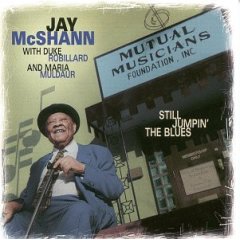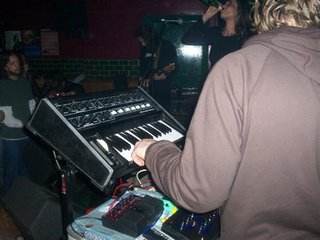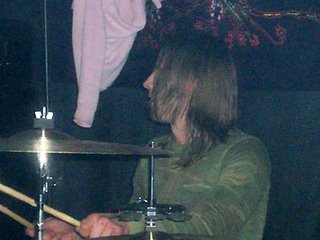A bit delayed on the posting front - an exhausting (but rewarding) recording session with the boys - followed by my usual health nose dive coupled with a tooth infection. What larks... All sorted now - hopefully. So: probably the last one before xmas... 'tis the season to be jolly...
Thelonious Monk recorded his first album for Columbia in 1962 (released in 1963). His composition 'Bright Mississippi,' based on 'Sweet Georgia Brown,' shows the harmonic bones underneath in the theme and in constant references throughout both Charlie Rouse's solo and Monk's - one of his best, I think – yet somehow remains a quintessential Thelonious theme. Moving on two levels interestingly...
Another pianist... the boogie woogie stomper, Pete Johnson, one of the Big Three, along with Meade Lux Lewis (what a great name...) and Gene Ammons' old man, Albert, here employing that mighty left hand on his solo tour de force – 'Roll 'Em Pete.' Interesting to speculate on the influence of boogie piano – surely the most rhythmic and 'drum like' of styles. Conlon Noncarrow, for one, acknowledged his debt to the genre... Cecil Taylor – via Monk – perhaps? Always something grounded and down about Cecil, no matter how abstract. (Jaki Byard, of course - but he could play the whole history from ragtime upwards...)
Paul Bley from the sixties and 'Closer.' Spare and dissonant, probing, against a suitably enigmatic bass and drums. Going into an emotional space some way from the previous two offerings – oddly the Monk nearer to Johnson, I feel, despite his own crashing dissonances that make the bridge back to Bley. Yet all jazz...
George Russell 1956 – the avant garde of the day in a dense and complex composition featuring Bill Evans 'Concerto for Billy the Kid' – shades of Copland in the title – the pianist launching strings of piercing single note lines that unpeel from the harmonic structure, displaying the inherent linearity of Russell's approach, Evans sounding as if the figure of Lennie Tristano is hovering at times. Hard hitting piano. Art Farmer taking a nice solo – an often underrated thinker who ventured down some interesting paths... A piece that ambitiously tries to bring composition and improvisation into balance... My own thought about these attempts to break the fifties perimeter fence is that the key was rhythm - when the drummers took it away from straight or even implied four four the space was opened... Elvin Jones, Tony Williams but ultimately Sunny Murray and the others were needed... after that everything drops into place...
Louis Armstrong recorded 'Wild Man Blues' in 1927 with his Hot Seven. Some debate as to whether this is a Jelly Roll Morton composition or one of Louis'... what is not in dispute is the majestically assured trumpet – taking the breaks in doubled time and hinting at rhythmic complexities way beyond the backing musicians. Louis is all over this – although Johnny Dodds runs him close...
Pepper Adams was a mighty baritone player who could ride the unwieldy horn dashingly through the bop landscape and beyond. This is 'Bloos Booze' – a twelve bar that starts with Elvin Jone's cymbals, an odd, lurching tramp of a bass figure and Hank Jones trinkly treble figures before the odd yet matched front line of baritone and euphonium take the theme. Adams solos, leisurely spinning a satisfyingly melodic improvisation – he regarded Wardell Gray as an influence which is telling. Bernard McKinney has a warm, rubbery sound on the euphonium, plenty of space here for his relaxed solo. Hank Jones tips in some classy single note bebop – mainly up the keyboard. Duvivier weighs in for a couple of choruses, eloquent across the bass range. Melody central and swinging all the way through. A gem...
The first of the two long tracks is a kind of homage to my South African roots that demonstrates both the best of that country's artistic endeavours and the shadow that apartheid threw over so many of its citizens. Chris McGregor and the Blue Notes – white pianist amid black band members – came to Europe in the sixties to escape the hassles back home that an interracial group had to undergo. They were an invigorating breath of sweet and fiery fresh air – mutating into the Brotherhood of Breath indeed, incorporating like-minded European musicians such Skidmore, Surman, Osborne (who had a wild trio called SOS as I remember...) and the others on tap here. 'Night Poem' offers so much as it unfolds – beginning with flutes and African slanted rhythms that offer a hint of what 'world music' was to become – or rather what it could be – as the piece slowly builds into a sprawling, surging triumph of the spirit...
Evan Parker played with the Brotherhood of Breath on some notable sessions. Here he is, the quiet revolutionary, unpacking his ground-breaking long line solo saxophone playing on a track from 'The Snake Decides,' 'Leipzig' Folly.' There is a rigour to his playing, an iron integrity that makes his technical innovations the more satisfying... Is this jazz? To quote one of the current catch-phrases doing the rounds, 'Am I bothered?'
Finally – as promised/threatened last week... but it has to be done... the MJQ playing 'First variation on God rest you merry gentlemen.' My only overtly Xmas track. The Modern Jazz Quartet always have a special place in my heart because they were the first live group I ever saw as a wide-eyed young jazz fanatic way back when at the De Montfort Hall in Leicester, in the days when the stupid Brit MU embargo made visiting Americans so much rarer an entity. I still love this track...
So: Merry Xmas to all... I'm off to the wilds of Cumbria in a couple of days... to return invigorated with another batch of musics and a New Year's Eve mix - next year we may start to stretch out more...
In the Videodrome...
A Xmas feast...
A rare
1954 glimpse of the cool school in action... complete with mellophone... sans Tristano... add Billy Taylor...
... MJQ strike
gold......Oliver Nelson, Art Farmer and Lee Konitz (again) are
'Just Friends'...... an oblique link via the cool school to Brit altoist
Bruce Turner...... back to
FREE JAZZ... compendium clip... some cool hats and Bill Dixon in a scarf...
... and wheeling back to 1962...
finale of the American Folk Blues Festival...
... Stan Getz and Mary Lou Williams doing
'Lush Life'... ... this time of the year we all need
Spiritual Unity don't we? A nice reminder of a great gig that I never got round to reviewing... thanks Chris...
Thelonious Monk
(Thelonious Monk (p); Charlie Rouse (ts); John Ore (b); Frankie Dunlop (d) ).
Bright Mississippi
Download
BuyPete Johnson
(Pete Johnson (p) ).
Roll 'em Pete
DownloadBuyPaul Bley
(Paul Bley (p) Steve Swallow (b) Barry Altschul (d) ).
Closer
DownloadBuyGeorge Russell
( Art Farmer (tp) Hal McKusick (fl, as) Bill Evans (p) Barry Galbraith (g) Milt Hinton (b) Paul Motian (d) ).
Concerto for Billy The Kid
DownloadBuyLouis Armstrong
(Louis Armstrong (cnt); John Thomas (tb); Johnny Dodds (cl); Lil Armstrong (p); Johnny St. Cyr ( bjo); Pete Briggs (tu); Baby Dodds (d) ).
Wild Man Blues
Download
BuyPepper Adams
(Pepper Adams (bs); Bernard McKinney (euph); Hank Jones (p); George Duvivier (b); Elvin Jones (d) ).
Bloos Booz
Download
BuyBrotherhood of Breath
(Chris McGregor: piano; Dudu Pukwana, Alan Skidmore, Mike Osborne, John Surman, Ronnie Beer (saxes/flutes etc); (Mongezi Feza, Nich Charig, Harry Beckett (t); Malcolm Griffiths, Nick Evans (tr); Harrie Miller (b); Louis Moholo (d) ).
Night Poem
Download
BuyEvan Parker
(Evan Parker (ss).
Download
Leipzig's FollyBuyModern Jazz Quartet
(John Lewis (p); Milt Jackson (vb); Percy Heath (b) Connie Kay (d) ).
Variation on God rest ye merry gentlemen
DownloadBuy










